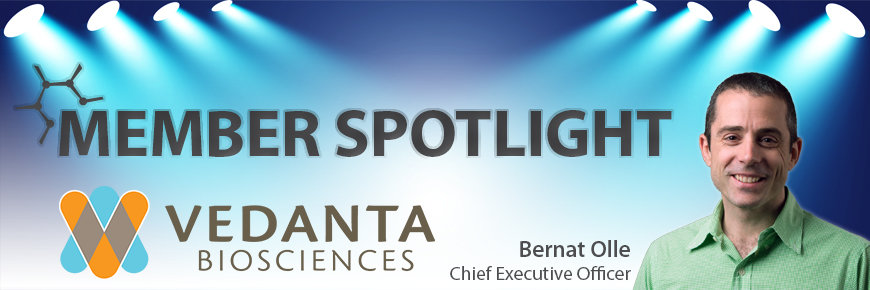
Every month, MassBio spotlights a member company and the great work they’re doing to advance the life sciences industry and support the patients we serve. This month we spoke with Dr. Bernat Olle, co-founder and Chief Executive Officer of microbiome-based therapeutic developer Vedanta Biosciences. In 2013, Dr. Olle was named “Innovator of the Year” in MIT Technology Review Spain’s “Innovators under 35” awards.
Tell us about your organization and your current initiatives.
Vedanta is developing a new class of drugs that consist of rationally defined bacterial consortia. The active ingredients of the drugs are live bacteria derived from the human microbiome. We select these bacteria from a very large, proprietary collection of tens of thousands of isolates that we have assembled in-house. From this collection, we systematically identify strains (and combinations of cooperating strains, or consortia) which our research suggests can restore colonization resistance against gut pathogens and stimulate protective immune responses. Once we have designed consortia that yield a desired response, our process development and manufacturing teams get involved in designing and scaling cGMP-compliant processes to make the drugs at our in-house manufacturing facility. These processes yield stable, high quality therapeutics in powder form for clinical studies.
We have recently entered the clinic with a candidate, VE303, for recurrent C.difficile infection, a pathogen that constitutes an urgent threat, according to the Centers for Disease Control and Prevention and the World Health Organization, and one that is often stubbornly resistant to antibiotic therapy, and responsible for 15,000 deaths in the U.S. each year.
How do your organization’s activities help patients now and into the future?
We aim to provide patients and doctors with a new therapeutic modality which addresses a major gap in existing drug classes: they were designed ignoring that we live in association with an ecosystem of trillions of microbes, and that our health and the well-being of this ecosystem are tightly interrelated. For example, disturbing this ecosystem with broad-spectrum antibiotics can have indirect consequences on our health by making us vulnerable to colonization by infectious pathogens. We are focusing first on enteric infectious diseases and immune diseases for which we believe there is substantial evidence that alterations of the gut microbiota can drive or worsen the pathology, and design drugs based on bacterial consortia that aim to repair these alterations.
Interest in and understanding of the microbiome has exploded in the last few years, as the scientific community has come to understand the degree to which our microbiota interact with and influence our bodily systems. We are now starting to identify specific mechanisms by which the microbiome impacts processes as diverse as development, immune responses, or hormonal control. The ramifications of research in this field thus ripple across much of medicine and they open up possibilities for new therapies that address disease-driving microbiome alterations.
What activities do you see as key for Massachusetts if it wishes to stay competitive as a global life-sciences hub?
Something I feel strongly about is unrestricted access to talent. Vedanta can be competitive because we employ talent from all over the world, from the United States, UK, Canada, Germany, Catalonia, the Netherlands, Japan, Colombia, India, Peru, and Brazil. We take this for granted in Boston – the Mecca of biotech – as the brightest scientists and entrepreneurs will want to come here. But we need to remember this is temporary. Just as they came, they may go. The current immigration system already lets a lot of talent get away (arguably forces it to get away in many cases), and over the next three years we see indications of a further contraction of talent if the new administration moves forward with ill-conceived legislation such as the H-1B visa reform. As an industry, I believe we need to push back against this because access to talent is a key risk to manage in our field, I believe even more so than access to innovations, capital, or space.
I would also add, on the latter point, access to space: lack of affordable lab space is a well-recognized problem in Cambridge and the solution to this will not come from real estate developers (it should, but it won’t). Over the last couple of years, we have seen a potential fix being field-tested with the LabCentral model, which has given access to affordable lab space to dozens of promising biotechs, including Vedanta. Now this model is being scaled and has quickly become a staple of Boston biotech. This is a testament to the importance of the unmet need being addressed: affordable space for small biotechs.
What’s next for your organization / what are you focused on in the coming year?
We expect to complete our Phase 1 study of VE303 in healthy volunteers in the first half of 2018, and are gearing up to initiate a Phase 2 trial for VE303 in recurrent C.difficile infection later in 2018, as well as two additional clinical studies in immune-mediated diseases.
We will also continue to expand key elements of our technology platform that support development of new candidates, including our microbiome datasets from human interventional studies, culture collection, high throughput screening systems, and manufacturing capabilities. An example of a new application we are targeting with our platform is the development of microbiome-based cancer immunotherapies. We have a number of collaborations with leading oncology researchers around the world, through which we gather data from interventional human clinical studies of checkpoint inhibitors to inform our immuno-oncology candidate design. In collaboration with our cofounder, Dr. Kenya Honda, we are working on a candidate consisting of a rationally defined bacterial consortium that potentiates cytotoxic CD8+ T-cells, which are key modulators of checkpoint therapy responses. We intend to file an IND for that candidate in 2018.
If you’re interested in being featured in MassBio’s Member Spotlight, please see guidelines here.